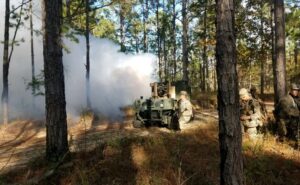Applied Intuition has received a two-year deal worth up to $49 million to provide an “end-to-end autonomy software development and test platform” for the Army’s Robotic Combat Vehicle program, the company said Monday.
The Army worked with the Pentagon’s Defense Innovation Unit (DIU) to select the Silicon Valley-based firm for the work, which aims to further the RCV program’s progress on requirements for off-road maneuvering, obstacle avoidance and safety.

“We are excited to bring our proven enterprise autonomy development toolchain to the Army’s RCV program,” Qasar Younis, co-founder and CEO of Applied Intuition, said in a statement. “Our modeling and simulation development environment will enable continuous improvement of autonomy software across the program’s lifecycle and will ultimately enhance the Army’s broader approach to autonomy stack development.”
While the Army has experimented with both light and medium versions of Robotic Combat Vehicles (RCV), Doug Bush, the Army’s top acquisition official, confirmed in August the service plans to move ahead for now with a focus on developing the light variant, the RCV-L (Defense Daily, Aug. 3).
Bush, at the time, said the Army is particularly focused on the software element for robotic platforms to ensure the ability to leverage the technology across a range of platforms.
“From an acquisition standpoint, we’re focused on…, in particular, the software, which will be critical for all ground robotics programs going forward. Getting that right early is going to be essential,” Bush said.
Bush noted the Army has separated out the software elements of RCV into its Software Acquisition Pathway effort “because we want that control software to be common across many robotic platforms.”
Colin Carroll, Applied Intuition’s head of government relations, noted the company’s deal with the Army as awarded through the Software Acquisition Pathway, which he called a “landmark achievement” for acquiring commercial modeling and simulation software.
“We look forward to helping the RCV program and the DoD quickly and safely scale production of autonomous systems,” Carroll said in a statement.
Applied Intuition said the modeling and simulation platform it will provide to the Army’s RCV program office will be used to “manage the development and test of software for mission and mobility autonomy for the RCV variants.”
The Army has also previously detailed its efforts to develop its own autonomy software called robotic technology kernel, or RTK, that was integrated on its RCV-L and RCV-M prototypes (Defense Daily, March 16).
Applied Intuition is also a member of General Dynamics Land Systems’ [GD] team vying for the Army’s Optional Manned Fighting Vehicle competition and helps support development of GD’s new Katalyst vehicle architecture (Defense Daily, Oct. 4).